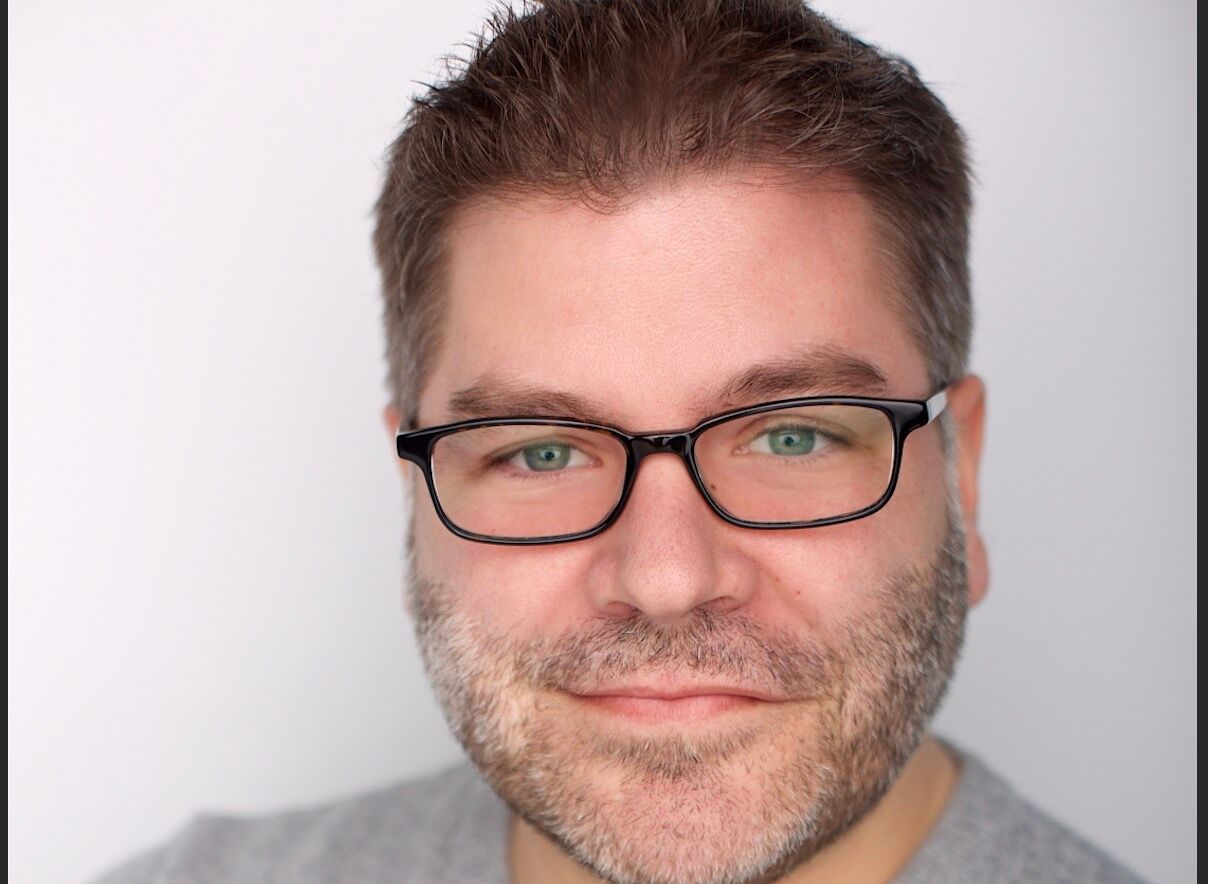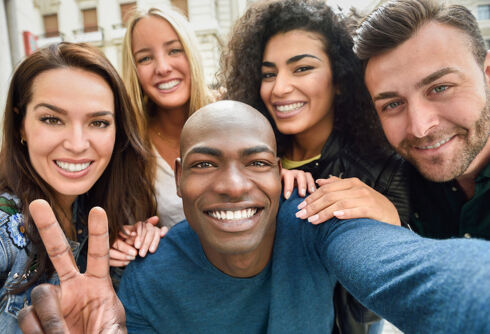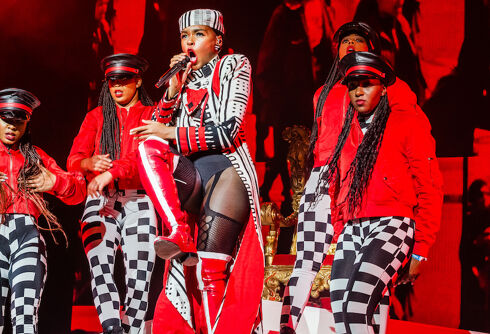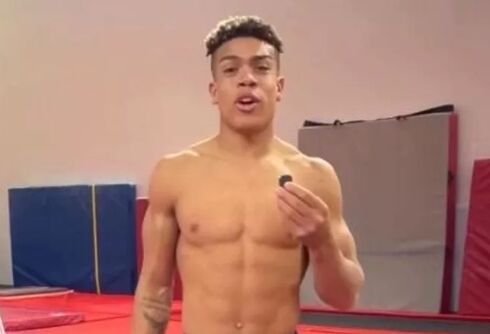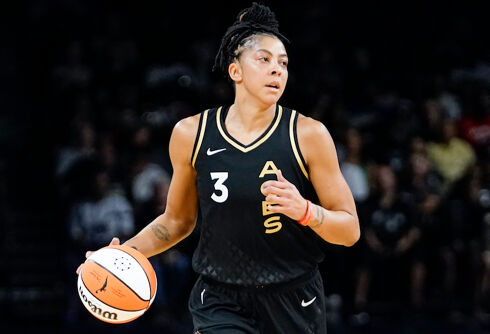Failure is Not Not An Option is Patrick Hinds’ hilarious account of the long and winding road that ultimately led him to happiness in both his professional life (as a successful podcaster) and in his personal life (as a husband and father). In a series of essays, Hinds – the self-described “chubby gay son of a Jesus-obsessed lesbian” – describes how playing a cow’s behind catapulted his acting demise, recounts an evening he spent being yelled at by Bea Arthur, and shares stories from his calamitous attempt at running an in-home daycare.
Hinds also details the unexpected sequence of events that led him and his husband to adopt their daughter, Daisy, through the foster care system, as well as the extremely short window between when he thought he wanted to stay child-free and the day he held Daisy in his arms.
Related:
Are queer women the future of tech?
With the advancement of Chat GPT and other AI technologies, Lesbians Who Tech founder Leanne Pittsford says workforce diversity is critical.
For LGBTQ+ people, family-building is almost always an active choice. For the most part, heterosexual couples don’t have to ask themselves, how should we have a baby? But queer families face this question every day, and it can feel extremely overwhelming to learn about the many options, much less decide which one feels right.
Never Miss a Beat
Subscribe to our newsletter to stay ahead of the latest LGBTQ+ political news and insights.
Hinds has been there, and he spoke with LGBTQ Nation about how his family came to be, what the process was like, and what other LGBTQ+ couples should think about when building families of their own.
LGBTQ Nation: What went into your decision to go the foster-to-adopt route to build your family?
PH: When Steve and I decided that we wanted to have a kid, we were instantly smacked in the face with the cost. We learned traditional adoption was in the $70,000 range, and then surrogacy, which didn’t really appeal to us anyway, but was also even farther out of reach – like, $130,000.
We tend to be impulsive people. And living in New York City, I had been seeing all over the subway system signs for foster care, and foster to adopt, and that seemed like such a good route for us because it was a) free, but b) and more importantly, we didn’t feel the need for our kid to share our DNA. We just realized, we live in New York, it’s the kind of place where all kinds of kids need homes. If we can become parents and also save a kid from a bad situation, that seems like the perfect match for us.
LGBTQ Nation: My knowledge of how all of this works is basically limited to the movie Instant Family. Can you talk about what the training entails and some of the challenges?
PH: It was not at all what I expected. It’s a 10-week class that you have to take to get licensed as a foster parent. I assumed it was parenting basics and they taught you how to like, change a diaper and feed a baby… No, it is much more geared towards foster parents who are looking to take in teenagers, where the greatest need is, especially in New York. There’s a big need for fostering LGBTQ+ kids who have been kicked out of their houses. So the training was mostly all centered around that, about, like de-escalating conflict, how to deal with birth parents if there’s visitation, and none of that really applied to us because we were really clear that we were looking to foster a baby.
So we went and participated, and we really loved our teacher, and we got kind of close with the other people in the class. But it was very, very much geared towards foster care as you traditionally think about it, which is kids need a placement for a finite period of time and are likely going to go back to their birth parents.
LGBTQ Nation: You ended up getting matched with a baby extremely quickly. Is it correct to say that’s rare?
PH: It’s kind of hard to say. I’ve said since our time in the foster care system that it’s a little opaque. The foster care system desperately needs foster parents, and I think there’s a little bit of telling you what you want to hear, but also being upfront enough about certain things.
We learned in the system that most foster parents aren’t necessarily interested in adoption. We went in really not knowing anything, and we learned quickly that the goal of foster care is always reunification with the birth parents. We fully understood that. But if there were a way to say like, could we possibly be matched with a kid that had a high likelihood of being put up for adoption, that would be our preference.
As I write it in the book, we turned in our paperwork for our license on a Thursday morning, and Thursday afternoon we got a call from our agency saying they had a baby who had come into the system that day and had a sibling that had been removed from the home and had been ultimately adopted by the family that had fostered them. So that was one of the things that sort of seemed like, this could be a checkmark towards like, maybe this baby would also wind up in an adoptive situation. We talked about it in a matter of seconds and decided yes, this felt right. This is it.
LGBTQ Nation: What kind of thoughts were going through your head when it was happening that fast? Did you even own any baby products?
PH: It’s funny because you know, like being foster parents and not knowing when you’re gonna get a kid, you really do miss out on that anticipation, that moment of getting to go to the store and buying all the clothes. You don’t know if you’re getting a boy or a girl, you just don’t know anything. You do have to have a crib in order to be licensed. So we did have that. But we didn’t have anything.
I mean, we were just kind of like, Oh my god. We were expecting it would be months or years. So we didn’t really have clothes, we didn’t have baby food or formula. We didn’t even have, like, a rocker, you know. We didn’t have toys.
Luckily we got the news on a Thursday, and the baby didn’t actually come to us until Monday morning. So we did have the weekend to prepare and get all the things that we could possibly get. But imagine you find out that you’re having a baby the traditional way, and you have nine months to get ready for it. We had like 48 hours.
LGBTQ Nation: How old is your daughter now?
PH: She is nine and a half. She just had her half birthday, she will tell you, in September.
LGBTQ Nation: What have been the unique benefits and/or challenges that you have found to parenting a child adopted from foster care?
PH: We definitely early on found a community of foster parents. Being a foster parent, I always say, is like you’re like a glorified babysitter. You have absolutely no rights. And yet, you know, at least in our case, we were the only parents our kid knew. Her adoption didn’t go through for two and a half years, which is the right thing because it gives the birth parents as much time and as much opportunity as possible to do the things they need to do to get their kid back.
And, again, we fully understood that was the goal of foster care, and we supported that goal. But in that two and a half years, we couldn’t get her hair cut without getting permission through the agency. We couldn’t travel out of state without getting permission through the agency. There was one night she was having what we thought was an allergic reaction, and we couldn’t even take her to the hospital without getting permission from the agency. So you know, it was challenging in those ways, but we also found a lot of community, you know, fellow foster parents. It was a really lovely thing to be a part of that community when we were in it.
And the benefits, I can say now having an adopted kid, there are so many unanticipated benefits, like we have a kid who, in so many ways, is very different from me and Steven, my husband. She’s very sporty, she’s a little bit on the shy side, and it’s kind of amazing what having a kid who is different from you in certain fundamental ways really teaches you about yourself and how you grow. There’s that expression, the child raises the parent. And in some ways, it’s really, really true. It’s funny when I think about what it would be like to have a little me running around, bursting with energy and just being a lot over the top. And then I look at my daughter, Daisy, and she’s just so the opposite of that. And it’s so wonderful to experience raising a kid like that.
LGBTQ Nation: I imagine, like, most queer parents, you have dealt over the years with inappropriate questions from people about how your family came to be. How do you handle those moments?
PH: Living in New York, I do think that people are hypersensitive to not asking questions like that. And if I’m being honest, it doesn’t bother me so much. If you try to approach it from like, they’re just curious or just trying to be nice. Or a lot of times, they’re just trying to show us that they’re accepting and they’re curious and they’re interested.
People will ask questions that, when Daisy was much younger, we hadn’t even addressed with her. So that’s uncomfortable. As outgoing and as opinionated as I am, I’m a little timid when it comes to putting people in their place. But we do try to look at it as an opportunity to have honest conversations with Daisy. That is one of the things we’re like, no matter how uncomfortable or awkward a situation or a question can be, we never take for granted that Daisy has heard the question, and now she maybe has questions about the question. So we will try to be the adults in the room and take the opportunity to have a conversation with her so that she knows there are no secrets. There’s nothing that we’re ashamed of, you know? We try to be able to talk about everything with her.
LGBTQ Nation: What advice would you give to queer couples who are overwhelmed by all the different ways they could build a family and are trying to figure out what’s right for them?
PH: As I said in the book, we always prided ourselves on not wanting kids. And then when we realized in a dramatic moment that we really did want kids, all of a sudden we felt very behind the eight ball, and we felt a lot of pressure to figure it out fast, that our biological clocks were ticking and time was ticking… I would say, take a deep breath. I don’t know if people feel the age pressure, I don’t want to put that on them if they don’t, but I always say the older you are when you become a parent, the better because you know more. You’re just calmer and you just have more life experience and more life perspective.
So whatever the pressure is that you’re feeling, try to take the pressure away, and remember that creating a family is the most beautiful thing you can do, if that’s what you want. Just try to keep the goal in mind. And be realistic. Like, we couldn’t afford $70,000. We couldn’t afford $130,000. So we got creative, and we found a way to do it. I think that anybody who really wants to have a family but has barriers, whatever the barrier, whether they’re financial or not, whatever they are, you will find a way to make it happen. So just keep your eye on the prize. Reach out to your community, find the support when you need it. And just keep putting one foot in front of the other.


